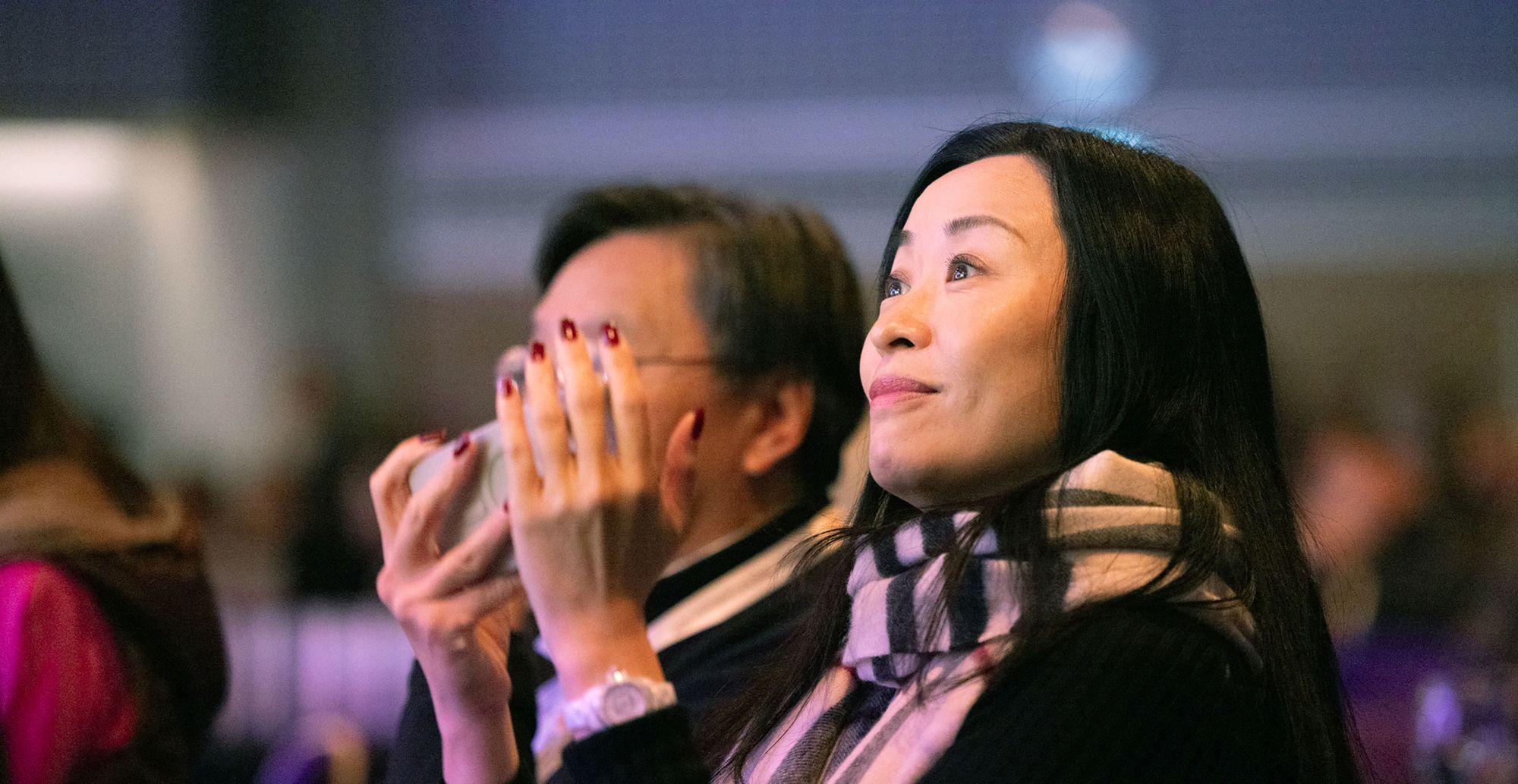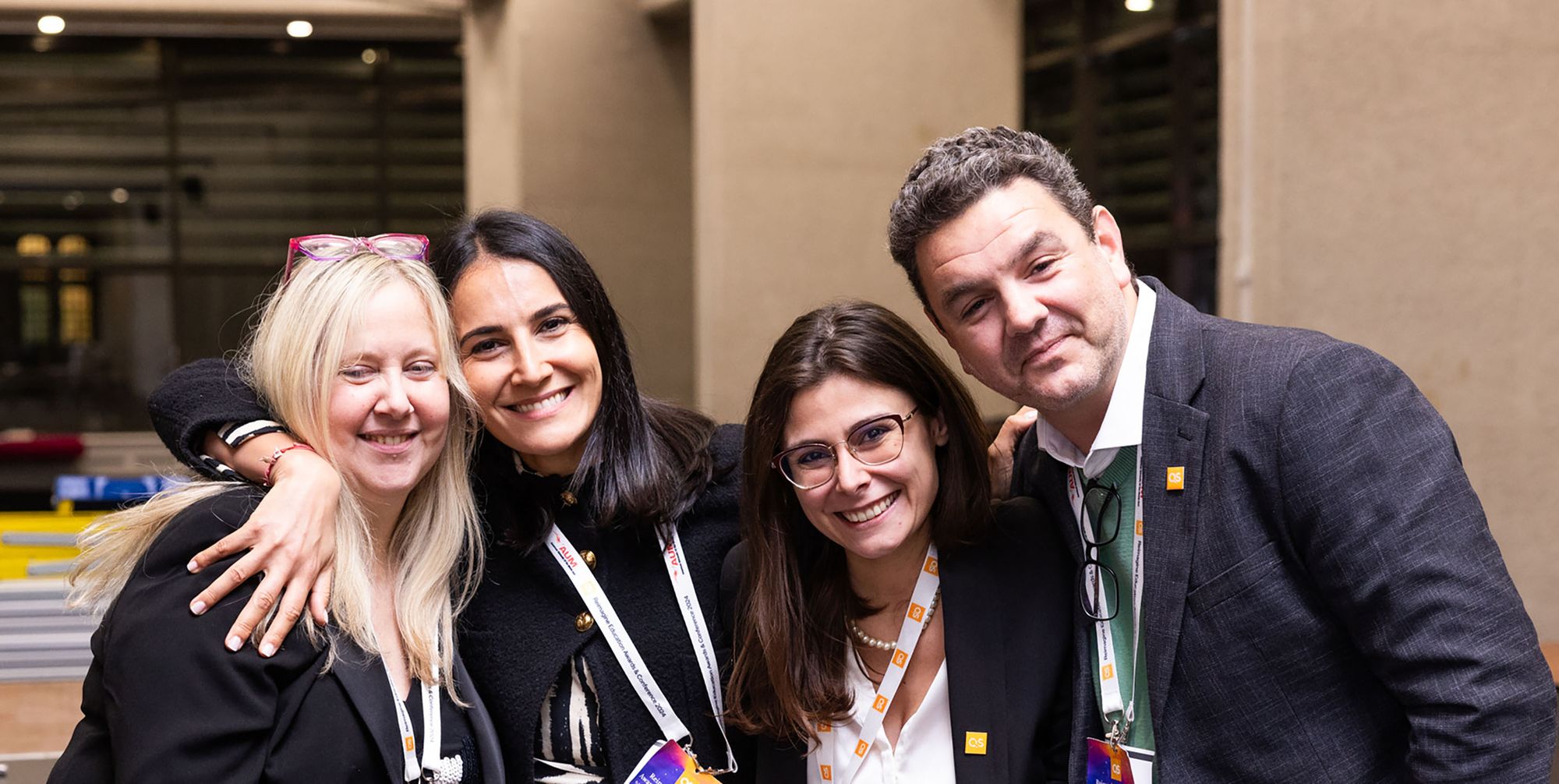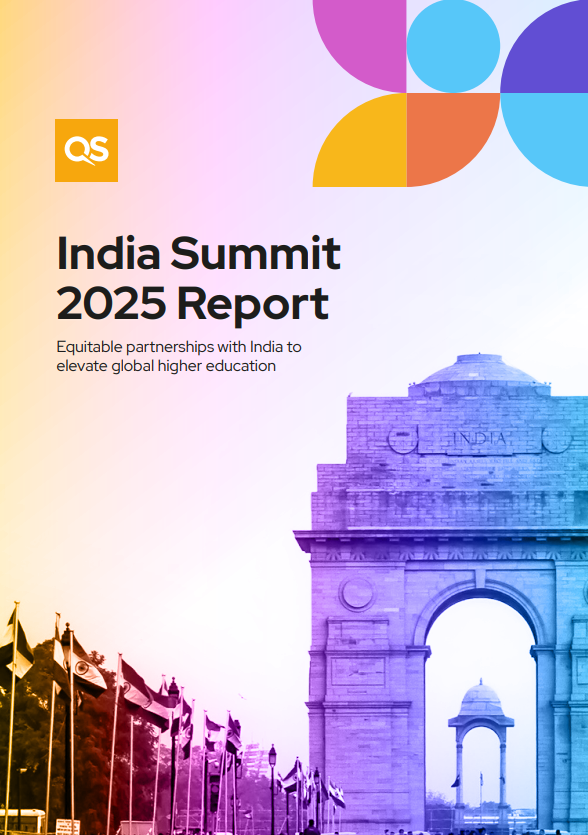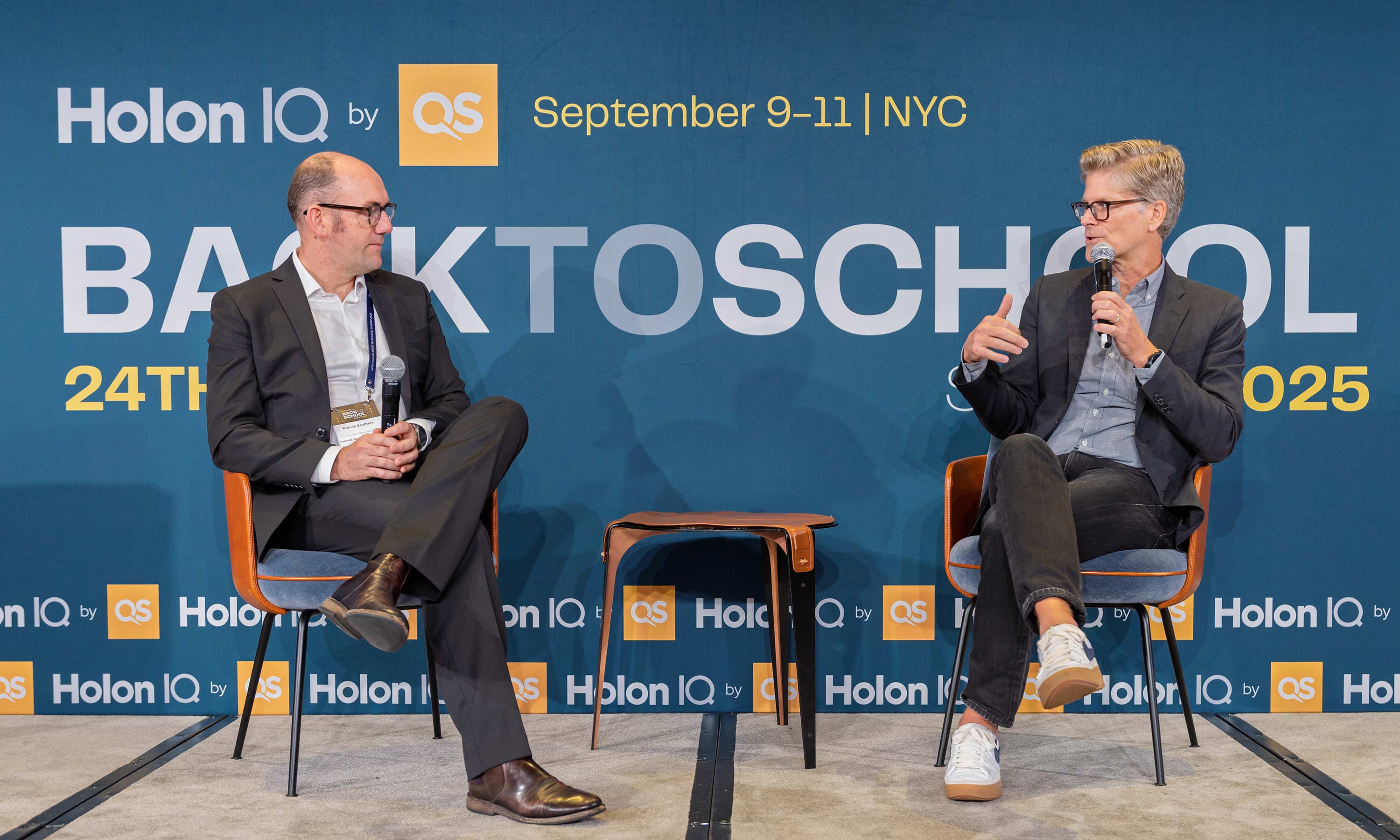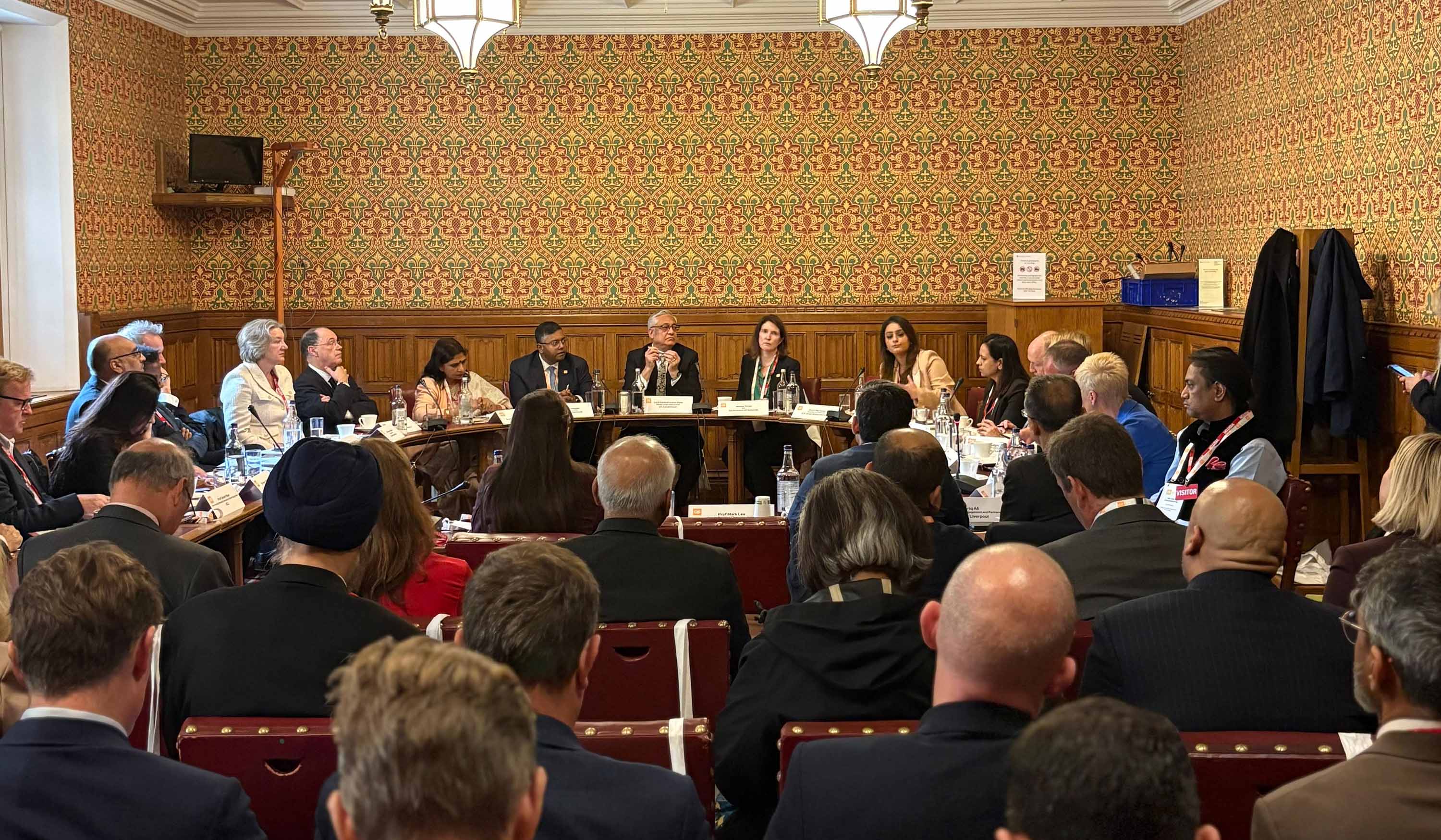The QS India Report 2025 captures the key insights and discussions from the QS India Summit 2025. Explore a preview below, and download the full report for the complete picture.
Keynote: Equitable partnerships to elevate global higher education
Jessica Turner
Chief Executive Officer, QS Quacquarelli Symonds
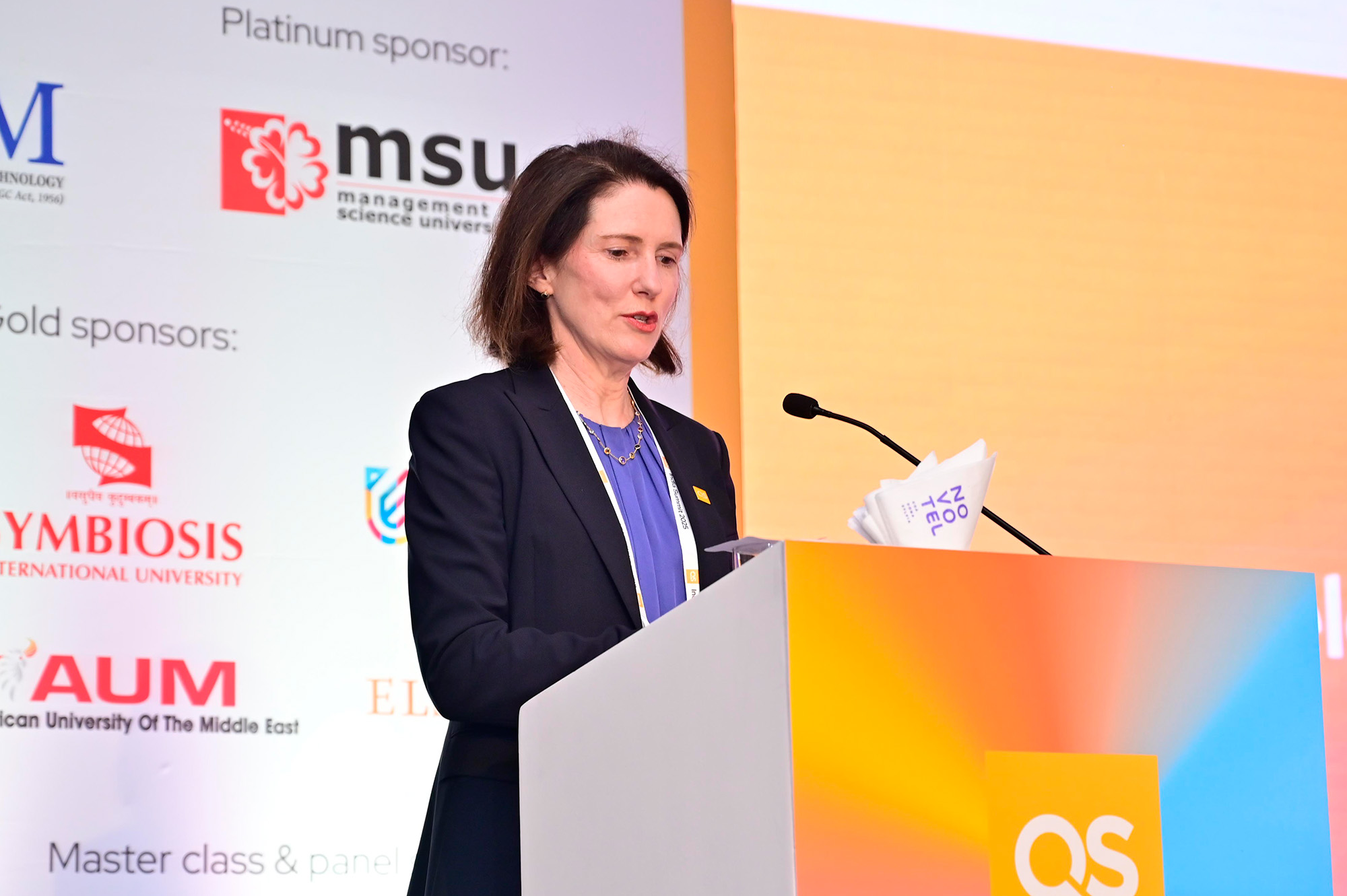
The QS India Summit celebrated its sixth year this year - with QS Quacquarelli Symonds’ CEO Jessica Turner noting in her keynote address that the Summit is now the leading thought-leadership forum for Indian higher education.
After thanking SRM University, the Government of India, and event sponsors for their support, Turner used her keynote address to set the tone for the Summit by highlighting the rapid rise of Indian higher education on the world stage, driven by the National Education Policy (NEP) and deepening global connections.
India’s momentum is demonstrable. In the QS World University Rankings 2025, 26 of the country’s top 30 institutions moved up - with the Indian Institute of Technology Bombay leaping 31 places to 118 globally.
India has also excelled in reputation metrics, producing six of the world’s top 30 biggest climbers in Academic Reputation and five in Employer Reputation.
Turner pointed to the inaugural QS World Future Skills Index, where India ranked second globally in the Future of Work indicator with a near-perfect 99.1/100, evidence of its agility in preparing a future-ready workforce. Turner noted that Prime Minister Modi framed this as part of a decade-long strategy to strengthen youth skills for self-reliance, innovation and wealth creation.
Prime Minister Modi described India’s performance in the QS World Future Skills Index as “heartening”, adding that over the past decade, his government has worked on "strengthening the youth by equipping them with skills that enable self-reliance and wealth creation”, adding that “leveraging technology” had contributed to making India a “hub for innovation and enterprise.”
Turner stressed that as the fastest-growing G20 economy and the most populous nation, India is uniquely placed to address challenges such as an ageing population, shifting GDP growth and the disruptive impact of AI on jobs.
Higher education, she argued, is at the heart of the solution - with India’s institutions already demonstrating frugal innovation and a track record in nurturing the next generation of entrepreneurs and innovators.
“The upskilling and reskilling challenge is global,” she said, “and getting it right in India will help the world.”
The Summit’s theme - Creating Equitable Education Partnerships Amid Global Uncertainties: India’s Role in Fostering Innovation and Research - reflected this urgency.
Turner called for meaningful cross-border collaboration between universities, educators, employers and policymakers to drive better outcomes worldwide.
With over 500 senior leaders from over 30 locations in attendance, she emphasised the opportunity for Goa to become a hub for forging these links.
Despite economic fluctuations, geopolitical shifts and climate challenges, however, Turner urged delegates to focus on the “huge potential for a new era in higher education” that equips graduates with transferable skills, innovation mindsets and a passion for lifelong learning.
Turner made clear that the Summit is not just a forum for discussion, but a platform to spark ideas, build partnerships, and accelerate transformation in global higher education - with India as both a leader and a bridge between worlds.
Keynote: From village to global stage - Driving educational excellence in India’s most populous state
Honourable Smt Anandiben Patel
Governor, Uttar Pradesh
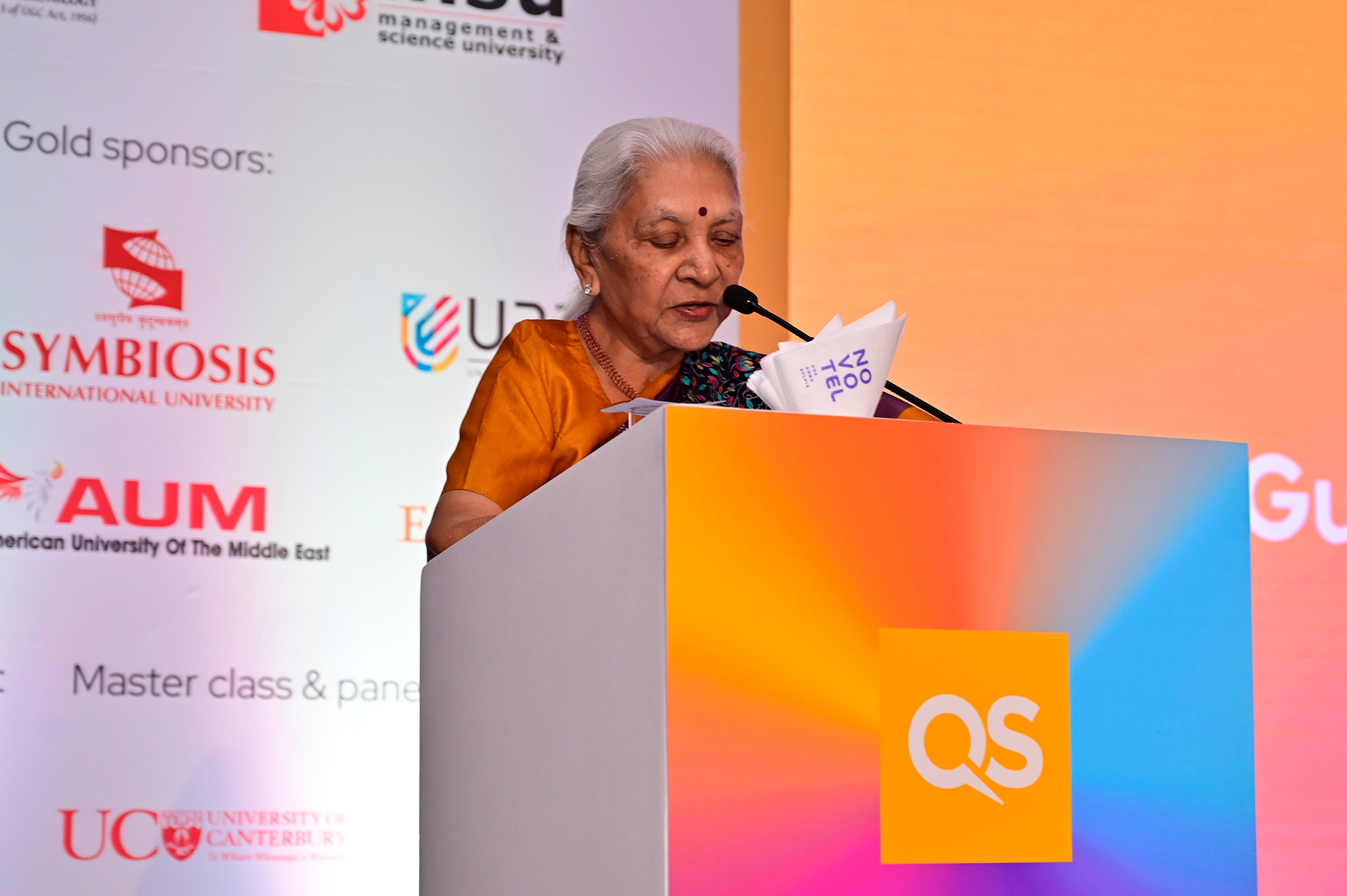
Governor Anandiben Patel spoke with conviction about transforming public higher education in Uttar Pradesh - a state with 240 million residents - into a model of academic excellence and social responsibility.
When she took office in 2019, no university in the state ranked among the top 1,000 globally or scored highly in national assessments. Today, through coordinated effort, eight universities have earned NAAC A+ grades, with Acharya Narendra Deva University of Agriculture and Technology achieving the rare A++ on its first attempt.
Five state universities have secured coveted UGC Category One status - enabling them to hire foreign faculty - an unprecedented achievement for any Indian state.
A combination of academic ambition with community engagement under the “KG to PG” vision is the foundation for her strategy.
Universities adopt five villages each, casting their influence beyond campus walls, supporting early childhood, women’s empowerment and access to government welfare schemes.
Anganwadi centres, previously lacking basic facilities, now benefit from university-funded furniture, learning materials and nutrition support - with over 30,000 centres receiving an upgrade without drawing on state funds.
Patel described higher education as a platform for tackling public health challenges, noting that the Prime Minister stated India needs to be tuberculosis free by 2025-26.
Patel says universities will adopt tuberculosis patients, providing nutritional and social support until recovery. But this isn’t the only healthcare challenge they aim to solve, Patel states that universities have launched cervical cancer vaccination programmes for girls from low-income families, too.
According to Patel, agricultural universities are training women farmers in modern techniques, while medical universities run rural health camps that connect patients to specialist care.
Her call to action for the global audience was direct: adopt and mentor under-resourced Indian universities, sign MoUs, co-develop research and publish jointly.
“Even a little collaboration from you will help,” she said, pointing to opportunities in fields from agriculture to cultural studies.
She urged delegates to see India’s diversity not as a challenge but as fertile ground for research and innovation, citing examples such as the Maha Kumbh festival as rich topics for global study.
By building cross-border academic alliances, she believes Indian public universities can overcome resource gaps and deliver transformative outcomes.
Patel closed with the ethos that underpins her work - Vasudhaiva Kutumbakam (“the world is one family”) - and a reminder that higher education’s role extends far beyond producing graduates.
It is about strengthening communities, driving equitable development and creating pathways for global collaboration that uplift entire societies.
Expanding global presence in India through international branch campuses: Unlocking opportunities for collaboration
- Chair: Dr Helen Kelly (Principal Consultant, QS), Marisa Mastroianni (Managing Director and Group CEO, University of Wollongong Global Enterprises), Dr Abhay Kumar Sinha (Director General, Services Export Promotion Council), Professor Mark E. Smith (President and Vice-Chancellor, University of Southampton), Ravneet Pawha (Vice President (Global Engagement) & CEO (South Asia), Deakin University).
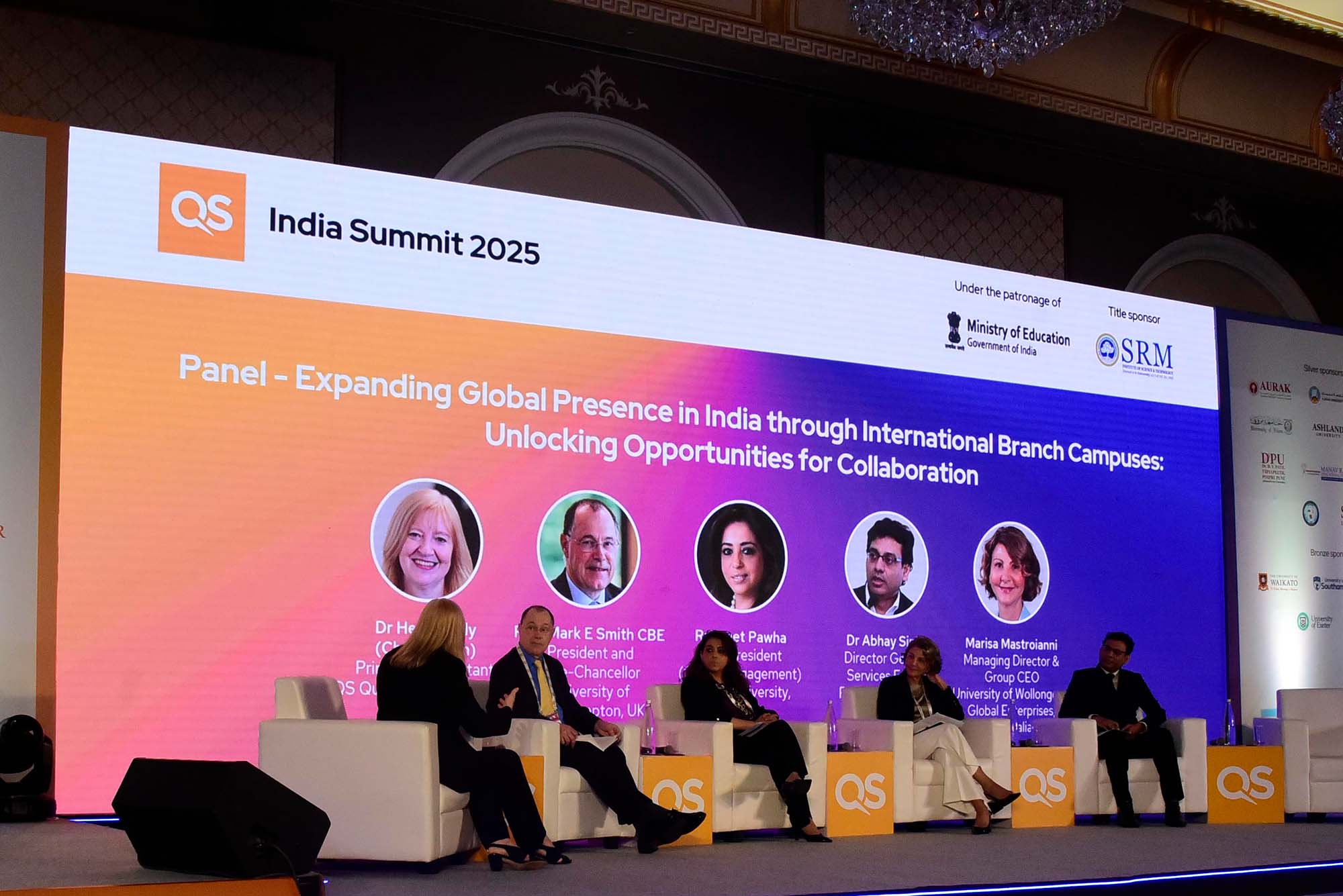
The first panel session of the QS India Summit tackled the bold and sometimes bumpy road to establishing international branch campuses (IBCs) in India.
The panellists shared their first-hand experience on what it really takes to succeed, from deep cultural understanding to patient regulatory navigation and implementation - demonstrating to delegates how to reap the rewards of international branches.
Ravneet Pawha began the discussion by talking about Deakin University’s three-decade story in India, showing how relationships built carefully over time evolve from student exchange programmes to full academic partnerships, joint academies and dual degrees.
She reminded delegates that a branch campus is more than bricks and mortar - it’s a commitment to understand the cultural and regulatory terrain before a student, faculty member or professor steps foot on it.
Professor Mark E. Smith spoke about what success means to him, noting that success lies in the “Triple Helix Model”, weaving education, research and industry into one fabric. To prepare graduates for the working world, Smith believes there is value in embedding employer perspectives into campus planning, helping employers to boost employability. India’s National Education Policy 2020, Equitable partnerships with India to elevate global higher educationhe noted, is opening fresh opportunities for such integrated approaches.
Marisa Mastroianni, Managing Director and Group CEO of University of Wollongong Global Enterprises spoke from personal experience, having seen - from Dubai to India - what makes an IBC thrive. She said long-term commitment, embedded industry links and a curriculum shaped with - not just for - local stakeholders.
Mastroianni argued that working hand-in-hand with businesses and government moves partnerships beyond the transactional into true collaboration.
Dr Abhay Kumar Sinha acknowledged that India’s regulations can be complex, but stressed the government’s intent to welcome serious foreign entrants. He urged universities to tackle policy hurdles in partnership with industry and local institutions, ensuring alignment with India’s development goals.
During a lively Q&A, Professor C. Raj Kumar challenged the panel on regulatory realities. Smith shared that his dealings with regulators have been largely constructive thanks to open dialogue, while Pawha agreed - but cautioned that the process itself can still be labyrinthine. Her advice? To keep the student experience as your north star.
The panel agreed that IBCs won’t cannibalise overseas study demand. Instead, IBCs broaden choice for students and feed India’s expanding job market with globally attuned graduates.
Launching an IBC in India is not for the faint-hearted. It demands patience, persistence and a deep-rooted partnership mindset - but for those willing to invest, the potential rewards are immense.
"True success comes from weaving education, research, and industry together."
Addressing global uncertainties: Building resilient educational institutions
- Chair: Dr Vidya Yeravdekar (Pro Chancellor, Symbiosis International University), Professor Tariq Ali (Pro-Vice-Chancellor for Global Engagement and Partnerships, University of Liverpool), Professor Theo Farrell (Vice-Chancellor, La Trobe University), Professor Sir Peter Mathieson (Principal and Vice Chancellor, The University of Edinburgh), Professor Cheryl de la Rey (Vice-Chancellor, University of Canterbury), Professor Dr Sasha Roseneil (Vice-Chancellor and President, University of Sussex).
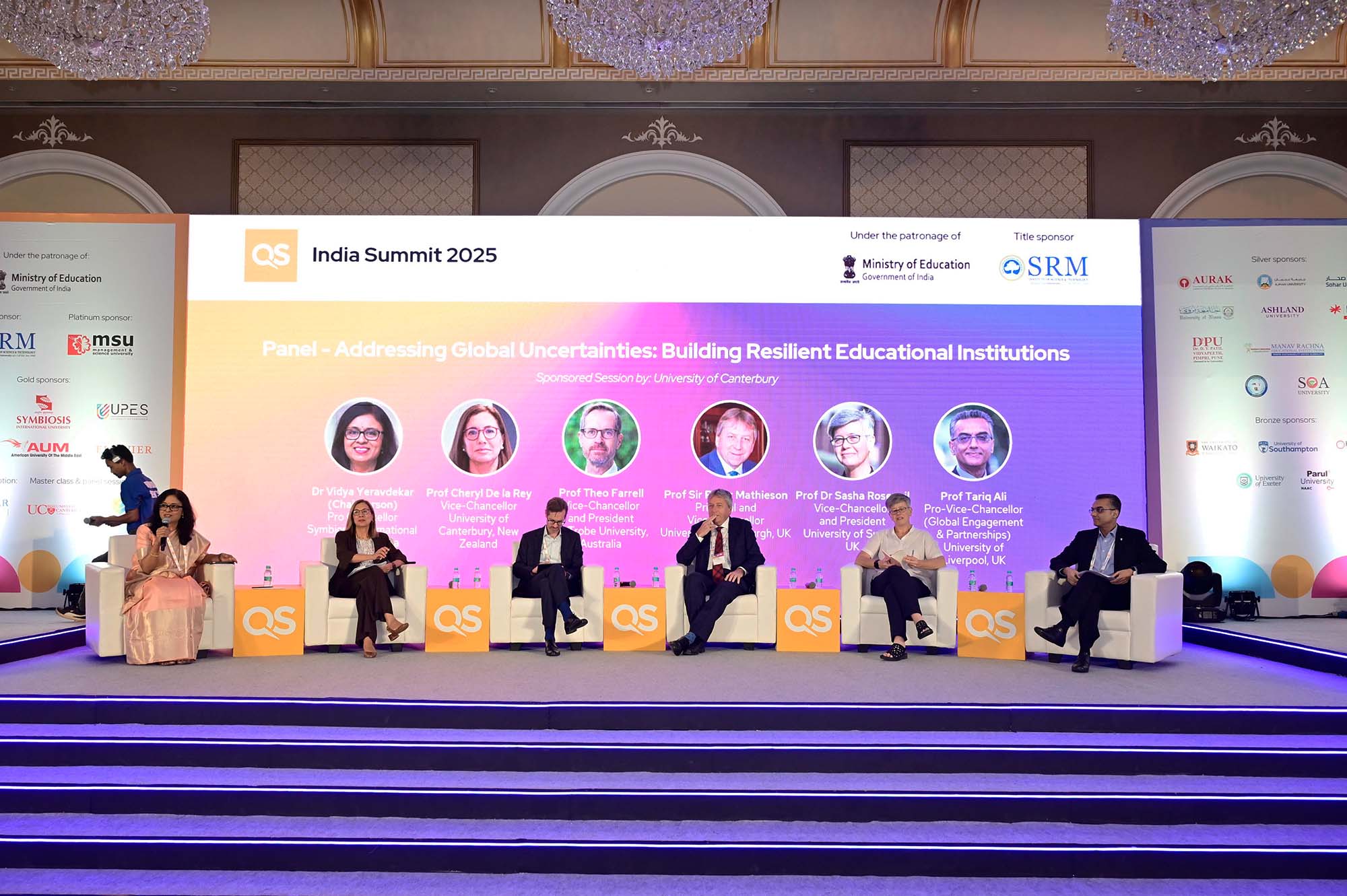
From pandemics to political instability, the world’s universities face a barrage of unpredictable challenges. This panel explored how leaders are building institutions that can withstand shocks — and even emerge stronger from them.
Opening the session, Dr Vidya Yeravdekar set the tone by naming the realities: COVID-19, geopolitical tensions, climate change, economic volatility and other crises that test the resilience of educational institutions.
As delegates listened intently, the discussion unfurled to demonstrate that resilience is less about weathering the storm, and more about evolving because of it.
Professor Cheryl de la Rey linked resilience to innovation and entrepreneurship, stressing that universities must leverage alumni networks not only for fundraising, but for creating lasting partnerships built on trust and shared history.
Professor Tariq Ali recounted the University of Liverpool’s rapid pandemic response - including mass community testing and the creation of the Pandemic Institute - as an example of how universities can pivot quickly when they tap multi-stakeholder collaboration.
When it comes to times of uncertainty, Professor Dr Sasha Roseneil urged institutions to face uncertainty head-on, grounding their strategy in enduring principles. She said at the University of Sussex, the focus on human flourishing, environmental sustainability and digital/data futures ensures agility while staying true to mission.
Of course, universities cannot succeed in big picture plans without the help of external parties, with Professor Theo Farrell emphasising the importance of partnering with communities. At La Trobe University, resilience is pursued through a net-zero emissions goal, AI-enhanced teaching and research that supports local economic growth. For Farrell, adaptability must extend beyond campus walls to benefit society at large.
Bringing a historical lens, Professor Sir Peter Mathieson reminded the audience that universities have survived centuries of change because they adapt without abandoning their core values. He warned against ignoring historical lessons and said adaptation was critical to universities’ enduring role as engines of societal development.
The panel agreed that building resilience means combining internal innovation with external collaboration - engaging students, alumni, communities, and governments in the process.
Resilience, they concluded, is as much about empathy and connection as it is about infrastructure and policy.
India as the skills capital of the world: Preparing students for corporate success
- Chair: Vik Singh (Trade and Investment Commissioner - South Asia, Austrade), Harry Anderson (Deputy Director - Policy and Global Engagement, Universities UK International), Professor Colin Bailey (President and Principal, Queen Mary University of London), Professor Rajul Gajjar (Vice-Chancellor, Gujarat Technological University), Dr Tere McGonagle-Daly (Deputy Vice Chancellor - Students and Global Engagement, Massey University), Hemant Sahal (Founder & CEO, Digii - formerly CollPoll).
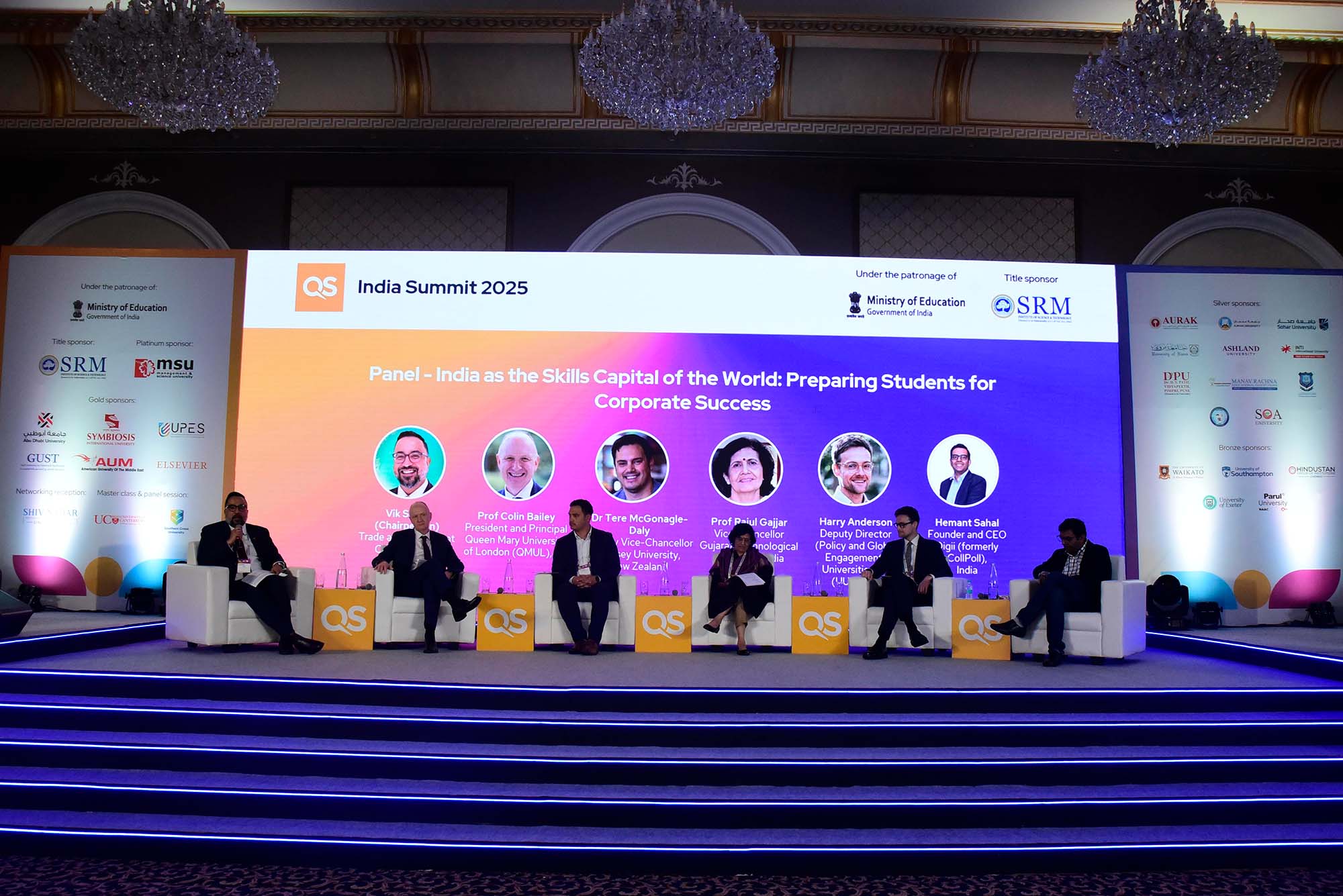
With one of the largest youth populations in the world, India is positioning itself as a global skills powerhouse. This panel explored how universities can build a workforce ready to thrive in a rapidly evolving corporate landscape.
Chairing the discussion, Vik Singh set the tone: if India is to be the “skills capital” of the world, higher education must work hand-in-hand with industry, government, and technology to produce graduates who are adaptable, confident and globally competitive.
If institutions are to prepare the leaders of tomorrow, education is no longer just about a degree. Dr Tere McGonagle-Daly emphasised the importance of lifelong learning and creating global citizens who can adapt to various disciplines and shifting industries. He called for flexible pathways that respond directly to market needs to achieve these goals.
From the UK, Professor Colin Bailey stressed the value of embedding global skills into the curriculum and listening to industry feedback, producing graduates with global skills adaptable to the ever-changing market. He spoke passionately about social mobility, urging universities to open doors for first-generation students and challenge themselves to innovate continuously.
Professor Rajul Gajjar shared Gujarat Technological University’s approach to integrating industry demands with academic frameworks, highlighting the use of leveraging the Academic Bank of Credit, and the importance of flexibility in curriculum design to accommodate industry-driven skills training.
Harry Anderson pointed to the UK’s long-standing track record of university–industry collaboration, underscoring that soft skills and adaptability are just as critical as technical expertise in preparing students for the future job market.
Hemant Sahal brought an entrepreneurial perspective on soft skills, arguing that students need systems that build self-awareness and help them understand their learning styles and strengths. Consciousness and self-awareness, he argued, are the foundation for aligning individual competencies with industry needs.
The panellists agreed on the critical interplay between education and skills, and called for continuous adaptation and collaboration with industry to ensure graduates are equipped with both theoretical knowledge and practical skills.
Panellists also agreed that rapid technological change - from AI to automation - requires agile, inclusive, and future-focused education ecosystems.
Curricula must evolve in real time, in partnership with industry, to ensure graduates leave not just with knowledge, but with the skills and confidence to lead.
Join us in Goa for QS India Summit 2026
Under the patronage of India’s Ministry of Education, we will explore this year’s theme: India@2047: Building Skills, Achieving Scale, Driving Innovation. Register your interest here.









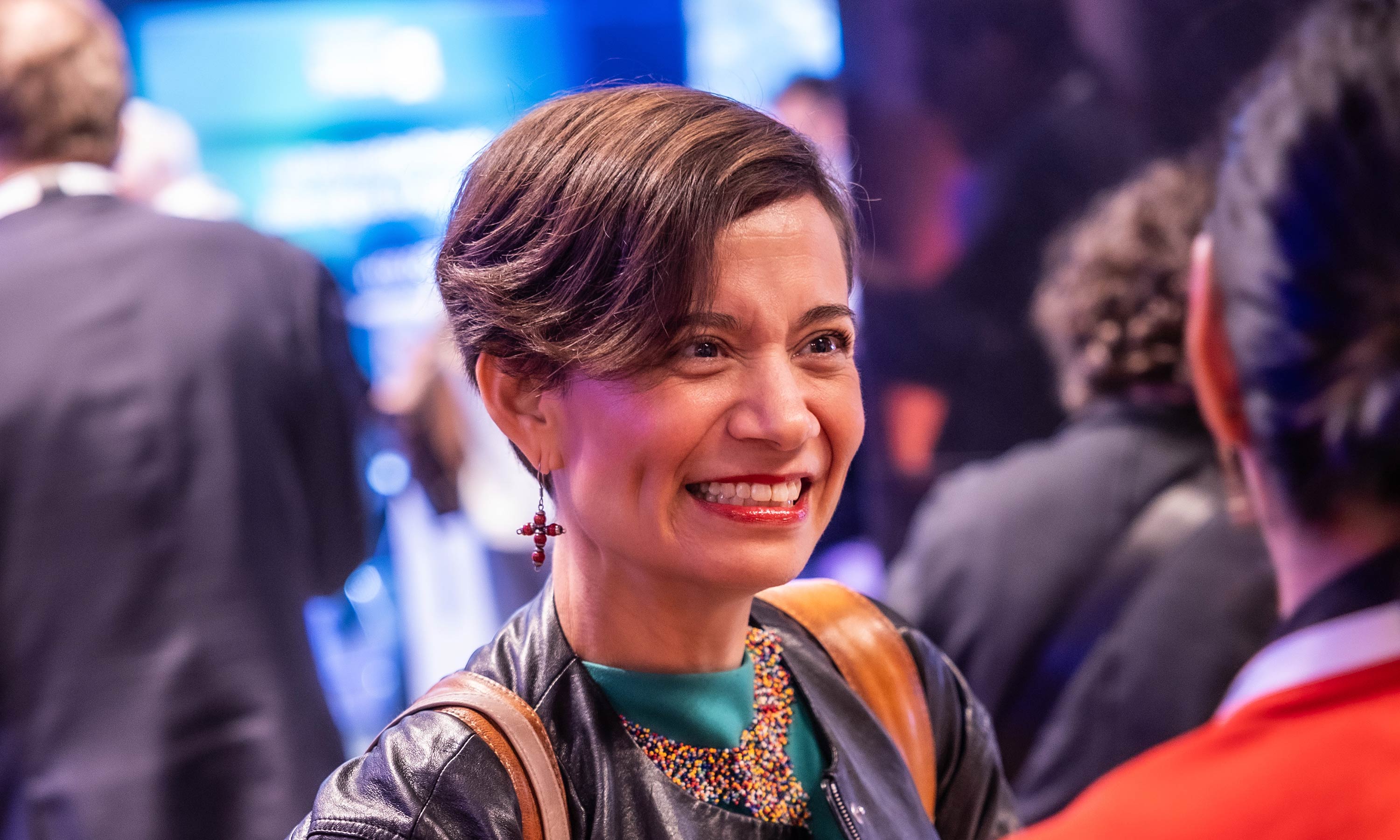
.jpg)
